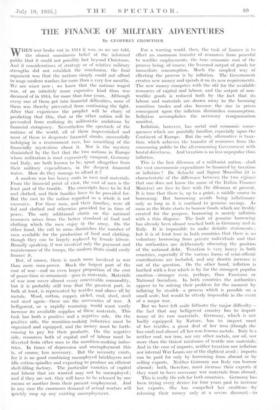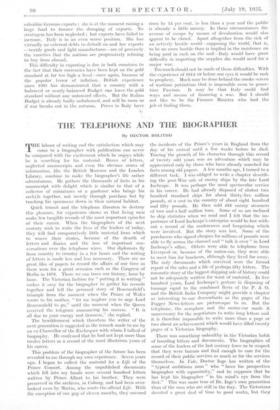THE FINANCE OF MILITARY ADVENTURES
By GEOFFREY CROWTHER WHEN war broke out in 1914 it was, so we are told, the almost unanimous belief of the informed public that it could not possibly last beyond Christmas. And if considerations of strategy or of relative military strengths did not establish the conclusion, the final argument was that the nations simply could not afford to wage modern warfare for more than a very few months. We are wiser .now ; we know that the nations waged ..war, of an infinitely more expensive kind than was . dreamed of in 1914, for more than four years. Although every one of them got into financial difficulties, none of them was thereby prevented from continuing the fight. After that experience the prophet will be chary of predicting that this, that or the other nation will be prevented from realizing its militaristic ambitions by financial stringency. Nevertheless the spectacle of the .nations of the world, all of them impoverished and 'most of them in desperate financial straits, successfully indulging in a rearmament race, has something of the financially mysterious about it. Nor is the Mystery diminished by the fact that the two nations in Europe ,whoSe militarism is Most expensively rampant, Germany and Italy, are both known to be, apart altogether from their military expenditures, in the deepest financial water. How do they manage to afford it ? A modern war has heavy costs in men and -materials. From the financial point of view, the cost of men is the least Part of the trouble. The conscripts have to be fed and clothed, and their families have to be provided for. But the Cost to the nation regarded as a whole is not excessive. For these men, and their families, were all "fed and clothed and otherwise provided for in time of peace. The only additional strain on the national resources arises from the better standard of food and *clothing which the men enjoy in the army. On the Other hand, the call to arms diminishes the number of *men available for the production of food and clothing, though they can be largely replaced by female labour. Broadly speaking, if war involved only the payment and maintenance of the troops, the modern State could easily finance it. But, of 'course, there is much more involved in war than mere man-power. Much the largest part of the cost of war—and an even larger proportion of the (list of peace-tithe re-armament—goes in materials. Materials Of war now cover almost every conceivable commodity, but it is probably still true that the greatest part, in bulk at least, is represented by textiles and above all by metals. Wool, cotton, copper, nickel, coal, steel, steel and steel again—these are the necessaries of war. A belligerent, or a rapidly rearming, world must vastly increase its available supplies of these materials. This task has both a positive and a negative side. On the positive side, the munition-making industries must be organized and equipped, and the money must be forth- coming to pay for their products. On the negative side, resources both of capital and of labour must be diverted from other uses to the munition-Making indus- tries. In. times of depression and unemployment this is, of course, less necessary. But the necessity exists, for it is no good combining unemployed bricklayers and idle cotton-spindles and expecting to produce an efficient shell-filling factory. The particular varieties of capital and labour that are wanted may not be unemployed ; and if they are not, they will have to be released by one means or another from their present employment. And in any case the enormous demand of actual warfare will quickly Mop up any existing unemployment. For a warring world, then, the task of finance is to effect an enormous transfer of resources from peaceful to warlike employments, the true economic cost of the process being, of course, the lessened output of goods for immediate consumption. Much the simplest way of .effecting the process is by inflation. The Government creates new money and spends it on its new requirements. The new money competes with the old for the available • resources of capital and labour, and the output of non- warlike goods is reduced both by the fact that its labour anff materials are drawn away to the booming munition trades and also because the rise in prices consequent upon the inflation diminishes consumption. Inflation .accomplishes the necessary reorganization unaided.
Inflation, however, has social and economic conse- quences which are painfully familiar, especially Upon the Continent of Europe. But the only alternative is taxa- tion, which achieves the transfer of resources from the consuming public to the all-consuming Government with brutal directness. And taxation is no less unpopular than inflation.
This is the first dilemnia of a militarist nation—shall the vast uneconomic expenditure be financed by taxation or inflation.? Dr. Schacht and Signor Mussolini (it is characteristic of the difference between the two regimes that one does not know the name of the Italian Finance Minister) are face to face with the dilemma at present. It is true that there is, up to a point, a middle course in borrowing. But borrowing avoids being inflationary only so long as it is confined to genuine savings. As soon as the State starts to borrow funds which are freshly created for the purpose, borrowing is merely inflation with a thin disguise. The limit of genuine borrowing has already been almost reached both in Germany and in Italy. It is impossible to make definite statements ; but it is at least true in both countries that there is no voluntary borrowing from private individuals and that the authorities are deliberately obscuring the position of the national debt. Taxation is very heavy in both countries, especially if the various forms a semi-official contributions are included, and any drastic increase is out of the question. On the other hand, inflation is loathed with a fear which is by far the strongest popular emotion—stronger even, perhaps, than Fascism° or National Socialism. In both countries the authorities appear to be solving their problem for the moment by inflating by stealth—a process which is possible on small scale, but would be utterly impossible in the event of a major war.
But we have left aside hitherto the major difficulty— the fact that any belligerent country has to import many of its raw materials. Germany, which is not badly equipped by Nature, has to import most of her textiles, a great deal of her iron (though she has coal) and almost all her non-ferrous metals. Italy hr s neither coal, nor iron, nor any other metals, nor oil, nor more than the tiniest minimum of textile' raw materials. And in the case of imports, neither taxation nor inflation nor internal War Loans are of the slightest avail ; imports can be paid for only by borrowing from abroad or by selling exports. Neither Germany nor Italy can borrow abroad; both, therefore, must increase their exports if they want to have necessary war materials from abroad.
This is really the rub for both countries. Germany has been trying every device for four years past to increase her exports. She has compelled her creditors—by releasing their money only at a severe discount—to subsidize German exports ; she is at the moment raising a large fund. to finance the dumping of exports. No stratagem has,been neglected ; but exports have failed to increase. Italy is in an even worse position. She -has virtually no external debts to default on and her exports —textile goods and light manufactures—are of precisely the varieties that the iiations are progressively refusing to buy from abroad.
This difficulty in exporting is due in both countries to the fact that their .currencies have been kept on the gold standard at far too high a level—once again, because of the popular, terror of inflation. • British experience since 1931 has demonstrated that a country with a balanced or nearly-balanced Budget an leave the gold • standard without any untoward effects. But the Italian • Budget is already badly. unbalanced, and will be more so if war breaks out in the autumn. Prices in Italy have risen by 15 per cent. in less than a year and the public is already a little uneasy. In these circumstances the avenue of escape by means of devaluation would also appear to. be closed. Apart altogether from the risk of an actively hostile world—supposing the world, that is, to be no more hostile than is implied in the insistence on being paid in cash on the nail—Italy would have great difficulty in importing the supplies she would need for a major war.
. Too much should not be made of these difficulties. With the experience 01 -1914-18 before our eyes it would be rash to prophesy. Much may be done behind the smoke-screen of wartime patriotism that is impossible even to peace- time Fascism: - It may be that Italy could find ways and . means of financing • a war. But I. should not like to be the Finance Minister who • had the job of finding them.-



























































 Previous page
Previous page